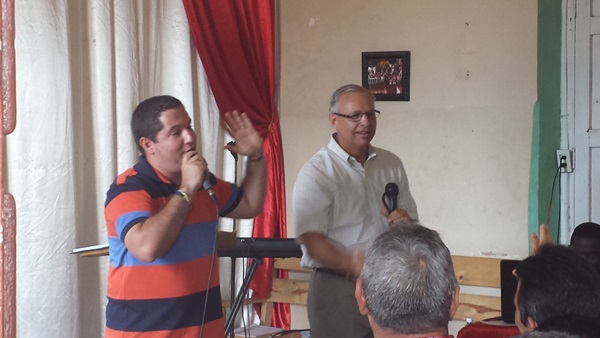World-Transforming Disciples
When Gil Hanke agreed to participate in Building Brothers, he never imagined that he would still be e-meeting with the same men six years later.
As general secretary of the General Commission on United Methodist Men, Hanke joined the group – which included Dan Schaffer, author of the book Spiritual Fathers – to determine how to modify it for The United Methodist Church.
"It's created a very close bond [among] the members of our group," Hanke said. "When there is joy in one of our lives, we all celebrate that. When there is concern, when there is pain, we share that. That kind of community is what men really need, where they can be honest with one another and talk about where they are in their relationship with Christ on a weekly basis.
"I had no expectation of staying in this group longer than a year. In fact, I wasn't sure I could make it a year," Hanke admitted. "It didn't take long for me to realize this is something I want to stick with."
Building Brothers works with local churches to help men grow in their relationships with God, become servant leaders and develop into spiritual fathers who help reproduce that spirit of Christlikeness in other men.
In adapting the material to offer a more Wesleyan focus, Hanke said United Methodist Men has been intentional about checking with Schaffer, whose book serves as the main curriculum, "to make sure we are walking a line that he's comfortable with."
David Bean, a men's ministry specialist at Culpeper (Virginia) United Methodist Church, became familiar with the Building Brothers process in 2007 at the Virginia Annual Conference.
"I felt the truth in there," Bean said about the teaching he found in Schaffer's book. "This is something very important that we need men to be involved in."
When the church started the program in September 2009, nine men joined Bean in the first generation. Now, five generations later, 64 men have gone through the process.
‘Servant leaders'
"What it's doing for our church is pretty amazing," he said. "Most of the men are in some type of ministry or leadership. They have stepped into their role of being what we call servant leaders."
Dan Obarski, who has been attending Culpeper since 2013, has benefited from participating in Wesleyan Building Brothers.
Obarski, who joined the fourth generation at Culpeper in 2015, said his wife and children would be the best people to ask about how participating in the group has shaped him.
"I am a completely different man after the Building Brothers process than I was prior to," he said. "I was very worldly and a self-involved, driven individual prior to us going to CUMC and me going to Building Brothers. Now I'm the last person I think of. It's not because of a mindset; it's a heart change."
Hanke said the length of the training can make men hesitant to join, so rather than expecting an immediate one-year commitment, he encourages men to meet for 12 weeks and then reevaluate.
"Invariably, when they do that, they build a community of men that hold each other accountable, that are serious about their relationship with Jesus Christ, and because of that community and because of the transformational power of intentionally seeking Christ in their lives, it continues," Hanke said.
Bean agreed, saying the Wesleyan Building Brothers model is "not a quick fix" but "a process."
"It's really the best way to create disciples because it lasts," Bean said, noting Jesus' ministry with his disciples serves as a model. "This is something that's proven to be a lasting thing for men to become what God wants them to become and to do the thing he's asked you to do, to fulfill who you are."
‘Very overwhelming, very humbling'
Wesleyan Building Brothers is one of several tools that United Methodist Men offers to local churches, Hanke said, pointing to such resources as a benefit of the larger church connection.
"Having it connected through the General Commission, we now have people that are willing and able to help local churches get this started, who are willing to help mentor and coach folks along the way," Hanke said.
Obarski said the relationships he has formed with other men in the church is the best thing about Wesleyan Building Brothers.
"You form very strong emotional bonds," he said. "I had rotator cuff surgery about a month ago. Then, two weeks ago, I had an emergency gall bladder removal. Guys just came out of the woodwork asking if they could help – offering to move snow out of my driveway, take care of my kids. It's very overwhelming, very humbling.
"When you get into Building Brothers, you end up with relationships and friendships with men who are pursuing servant leadership and spiritual fatherhood," Obarski said. "I think the relationships hold you to an accountability, and that drives you to continue to focus more on godly needs and desires than on earthly needs and earthly desires."
After Wesleyan Building Brothers was in place at Culpeper, Bean and his wife, Karen, began leading mission teams to Cuba, which opened doors for Bean to share the process with church leaders. Bean has taken numerous trips to Cuba to train groups on how the ministry might benefit them.
In fact, the national men's ministry president in Cuba invited Bean to speak to almost 600 men in October 2015. Each man who attended the event received a copy of Spiritual Fathers, which Bean worked to have translated into Spanish.
"If I hadn't said ‘yes' to what God was calling me to in starting a relationship with nine guys, none of this would've happened," Bean said. "That's how God works. God is just too good."
Emily Snell is a freelance writer in Nashville, Tennessee.

